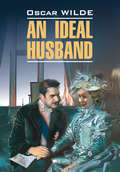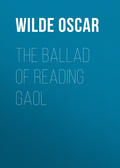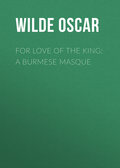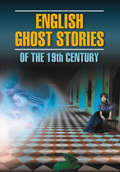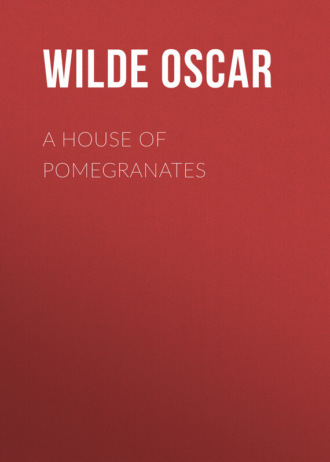
Оскар Уайльд
A House of Pomegranates
So he stole quietly across, and drew it aside. No; there was only another room, though a prettier room, he thought, than the one he had just left. The walls were hung with a many-figured green arras of needle-wrought tapestry representing a hunt, the work of some Flemish artists who had spent more than seven years in its composition. It had once been the chamber of Jean le Fou, as he was called, that mad King who was so enamoured of the chase, that he had often tried in his delirium to mount the huge rearing horses, and to drag down the stag on which the great hounds were leaping, sounding his hunting horn, and stabbing with his dagger at the pale flying deer. It was now used as the council-room, and on the centre table were lying the red portfolios of the ministers, stamped with the gold tulips of Spain, and with the arms and emblems of the house of Hapsburg.
The little Dwarf looked in wonder all round him, and was half-afraid to go on. The strange silent horsemen that galloped so swiftly through the long glades without making any noise, seemed to him like those terrible phantoms of whom he had heard the charcoal-burners speaking – the Comprachos, who hunt only at night, and if they meet a man, turn him into a hind, and chase him. But he thought of the pretty Infanta, and took courage. He wanted to find her alone, and to tell her that he too loved her. Perhaps she was in the room beyond.
He ran across the soft Moorish carpets, and opened the door. No! She was not here either. The room was quite empty.
It was a throne-room, used for the reception of foreign ambassadors, when the King, which of late had not been often, consented to give them a personal audience; the same room in which, many years before, envoys had appeared from England to make arrangements for the marriage of their Queen, then one of the Catholic sovereigns of Europe, with the Emperor’s eldest son. The hangings were of gilt Cordovan leather, and a heavy gilt chandelier with branches for three hundred wax lights hung down from the black and white ceiling. Underneath a great canopy of gold cloth, on which the lions and towers of Castile were broidered in seed pearls, stood the throne itself, covered with a rich pall of black velvet studded with silver tulips and elaborately fringed with silver and pearls. On the second step of the throne was placed the kneeling-stool of the Infanta, with its cushion of cloth of silver tissue, and below that again, and beyond the limit of the canopy, stood the chair for the Papal Nuncio, who alone had the right to be seated in the King’s presence on the occasion of any public ceremonial, and whose Cardinal’s hat, with its tangled scarlet tassels, lay on a purple tabouret in front. On the wall, facing the throne, hung a life-sized portrait of Charles V. in hunting dress, with a great mastiff by his side, and a picture of Philip II. receiving the homage of the Netherlands occupied the centre of the other wall. Between the windows stood a black ebony cabinet, inlaid with plates of ivory, on which the figures from Holbein’s Dance of Death had been graved – by the hand, some said, of that famous master himself.
But the little Dwarf cared nothing for all this magnificence. He would not have given his rose for all the pearls on the canopy, nor one white petal of his rose for the throne itself. What he wanted was to see the Infanta before she went down to the pavilion, and to ask her to come away with him when he had finished his dance. Here, in the Palace, the air was close and heavy, but in the forest the wind blew free, and the sunlight with wandering hands of gold moved the tremulous leaves aside. There were flowers, too, in the forest, not so splendid, perhaps, as the flowers in the garden, but more sweetly scented for all that; hyacinths in early spring that flooded with waving purple the cool glens, and grassy knolls; yellow primroses that nestled in little clumps round the gnarled roots of the oak-trees; bright celandine, and blue speedwell, and irises lilac and gold. There were grey catkins on the hazels, and the foxgloves drooped with the weight of their dappled bee-haunted cells. The chestnut had its spires of white stars, and the hawthorn its pallid moons of beauty. Yes: surely she would come if he could only find her! She would come with him to the fair forest, and all day long he would dance for her delight. A smile lit up his eyes at the thought, and he passed into the next room.
Of all the rooms this was the brightest and the most beautiful. The walls were covered with a pink-flowered Lucca damask, patterned with birds and dotted with dainty blossoms of silver; the furniture was of massive silver, festooned with florid wreaths, and swinging Cupids; in front of the two large fire-places stood great screens broidered with parrots and peacocks, and the floor, which was of sea-green onyx, seemed to stretch far away into the distance. Nor was he alone. Standing under the shadow of the doorway, at the extreme end of the room, he saw a little figure watching him. His heart trembled, a cry of joy broke from his lips, and he moved out into the sunlight. As he did so, the figure moved out also, and he saw it plainly.
The Infanta! It was a monster, the most grotesque monster he had ever beheld. Not properly shaped, as all other people were, but hunchbacked, and crooked-limbed, with huge lolling head and mane of black hair. The little Dwarf frowned, and the monster frowned also. He laughed, and it laughed with him, and held its hands to its sides, just as he himself was doing. He made it a mocking bow, and it returned him a low reverence. He went towards it, and it came to meet him, copying each step that he made, and stopping when he stopped himself. He shouted with amusement, and ran forward, and reached out his hand, and the hand of the monster touched his, and it was as cold as ice. He grew afraid, and moved his hand across, and the monster’s hand followed it quickly. He tried to press on, but something smooth and hard stopped him. The face of the monster was now close to his own, and seemed full of terror. He brushed his hair off his eyes. It imitated him. He struck at it, and it returned blow for blow. He loathed it, and it made hideous faces at him. He drew back, and it retreated.
What is it? He thought for a moment, and looked round at the rest of the room. It was strange, but everything seemed to have its double in this invisible wall of clear water. Yes, picture for picture was repeated, and couch for couch. The sleeping Faun that lay in the alcove by the doorway had its twin brother that slumbered, and the silver Venus that stood in the sunlight held out her arms to a Venus as lovely as herself.
Was it Echo? He had called to her once in the valley, and she had answered him word for word. Could she mock the eye, as she mocked the voice? Could she make a mimic world just like the real world? Could the shadows of things have colour and life and movement? Could it be that – ?
He started, and taking from his breast the beautiful white rose, he turned round, and kissed it. The monster had a rose of its own, petal for petal the same! It kissed it with like kisses, and pressed it to its heart with horrible gestures.
When the truth dawned upon him, he gave a wild cry of despair, and fell sobbing to the ground. So it was he who was misshapen and hunchbacked, foul to look at and grotesque. He himself was the monster, and it was at him that all the children had been laughing, and the little Princess who he had thought loved him – she too had been merely mocking at his ugliness, and making merry over his twisted limbs. Why had they not left him in the forest, where there was no mirror to tell him how loathsome he was? Why had his father not killed him, rather than sell him to his shame? The hot tears poured down his cheeks, and he tore the white rose to pieces. The sprawling monster did the same, and scattered the faint petals in the air. It grovelled on the ground, and, when he looked at it, it watched him with a face drawn with pain. He crept away, lest he should see it, and covered his eyes with his hands. He crawled, like some wounded thing, into the shadow, and lay there moaning.
And at that moment the Infanta herself came in with her companions through the open window, and when they saw the ugly little dwarf lying on the ground and beating the floor with his clenched hands, in the most fantastic and exaggerated manner, they went off into shouts of happy laughter, and stood all round him and watched him.
‘His dancing was funny,’ said the Infanta; ‘but his acting is funnier still. Indeed he is almost as good as the puppets, only of course not quite so natural.’ And she fluttered her big fan, and applauded.
But the little Dwarf never looked up, and his sobs grew fainter and fainter, and suddenly he gave a curious gasp, and clutched his side. And then he fell back again, and lay quite still.
‘That is capital,’ said the Infanta, after a pause; ‘but now you must dance for me.’
‘Yes,’ cried all the children, ‘you must get up and dance, for you are as clever as the Barbary apes, and much more ridiculous.’ But the little Dwarf made no answer.
And the Infanta stamped her foot, and called out to her uncle, who was walking on the terrace with the Chamberlain, reading some despatches that had just arrived from Mexico, where the Holy Office had recently been established. ‘My funny little dwarf is sulking,’ she cried, ‘you must wake him up, and tell him to dance for me.’
They smiled at each other, and sauntered in, and Don Pedro stooped down, and slapped the Dwarf on the cheek with his embroidered glove. ‘You must dance,’ he said, ‘petit monsire. You must dance. The Infanta of Spain and the Indies wishes to be amused.’
But the little Dwarf never moved.
‘A whipping master should be sent for,’ said Don Pedro wearily, and he went back to the terrace. But the Chamberlain looked grave, and he knelt beside the little dwarf, and put his hand upon his heart. And after a few moments he shrugged his shoulders, and rose up, and having made a low bow to the Infanta, he said —
‘Mi bella Princesa, your funny little dwarf will never dance again. It is a pity, for he is so ugly that he might have made the King smile.’
‘But why will he not dance again?’ asked the Infanta, laughing.
‘Because his heart is broken,’ answered the Chamberlain.
And the Infanta frowned, and her dainty rose-leaf lips curled in pretty disdain. ‘For the future let those who come to play with me have no hearts,’ she cried, and she ran out into the garden.
THE FISHERMAN AND HIS SOUL
TO H.S.H
ALICE, PRINCESS
OF MONACO
Every evening the young Fisherman went out upon the sea, and threw his nets into the water.
When the wind blew from the land he caught nothing, or but little at best, for it was a bitter and black-winged wind, and rough waves rose up to meet it. But when the wind blew to the shore, the fish came in from the deep, and swam into the meshes of his nets, and he took them to the market-place and sold them.
Every evening he went out upon the sea, and one evening the net was so heavy that hardly could he draw it into the boat. And he laughed, and said to himself, ‘Surely I have caught all the fish that swim, or snared some dull monster that will be a marvel to men, or some thing of horror that the great Queen will desire,’ and putting forth all his strength, he tugged at the coarse ropes till, like lines of blue enamel round a vase of bronze, the long veins rose up on his arms. He tugged at the thin ropes, and nearer and nearer came the circle of flat corks, and the net rose at last to the top of the water.
But no fish at all was in it, nor any monster or thing of horror, but only a little Mermaid lying fast asleep.
Her hair was as a wet fleece of gold, and each separate hair as a thread of fine gold in a cup of glass. Her body was as white ivory, and her tail was of silver and pearl. Silver and pearl was her tail, and the green weeds of the sea coiled round it; and like sea-shells were her ears, and her lips were like sea-coral. The cold waves dashed over her cold breasts, and the salt glistened upon her eyelids.
So beautiful was she that when the young Fisherman saw her he was filled with wonder, and he put out his hand and drew the net close to him, and leaning over the side he clasped her in his arms. And when he touched her, she gave a cry like a startled sea-gull, and woke, and looked at him in terror with her mauve-amethyst eyes, and struggled that she might escape. But he held her tightly to him, and would not suffer her to depart.
And when she saw that she could in no way escape from him, she began to weep, and said, ‘I pray thee let me go, for I am the only daughter of a King, and my father is aged and alone.’
But the young Fisherman answered, ‘I will not let thee go save thou makest me a promise that whenever I call thee, thou wilt come and sing to me, for the fish delight to listen to the song of the Sea-folk, and so shall my nets be full.’
‘Wilt thou in very truth let me go, if I promise thee this?’ cried the Mermaid.
‘In very truth I will let thee go,’ said the young Fisherman.
So she made him the promise he desired, and sware it by the oath of the Sea-folk. And he loosened his arms from about her, and she sank down into the water, trembling with a strange fear.
Every evening the young Fisherman went out upon the sea, and called to the Mermaid, and she rose out of the water and sang to him. Round and round her swam the dolphins, and the wild gulls wheeled above her head.
And she sang a marvellous song. For she sang of the Sea-folk who drive their flocks from cave to cave, and carry the little calves on their shoulders; of the Tritons who have long green beards, and hairy breasts, and blow through twisted conchs when the King passes by; of the palace of the King which is all of amber, with a roof of clear emerald, and a pavement of bright pearl; and of the gardens of the sea where the great filigrane fans of coral wave all day long, and the fish dart about like silver birds, and the anemones cling to the rocks, and the pinks bourgeon in the ribbed yellow sand. She sang of the big whales that come down from the north seas and have sharp icicles hanging to their fins; of the Sirens who tell of such wonderful things that the merchants have to stop their ears with wax lest they should hear them, and leap into the water and be drowned; of the sunken galleys with their tall masts, and the frozen sailors clinging to the rigging, and the mackerel swimming in and out of the open portholes; of the little barnacles who are great travellers, and cling to the keels of the ships and go round and round the world; and of the cuttlefish who live in the sides of the cliffs and stretch out their long black arms, and can make night come when they will it. She sang of the nautilus who has a boat of her own that is carved out of an opal and steered with a silken sail; of the happy Mermen who play upon harps and can charm the great Kraken to sleep; of the little children who catch hold of the slippery porpoises and ride laughing upon their backs; of the Mermaids who lie in the white foam and hold out their arms to the mariners; and of the sea-lions with their curved tusks, and the sea-horses with their floating manes.
And as she sang, all the tunny-fish came in from the deep to listen to her, and the young Fisherman threw his nets round them and caught them, and others he took with a spear. And when his boat was well-laden, the Mermaid would sink down into the sea, smiling at him.
Yet would she never come near him that he might touch her. Oftentimes he called to her and prayed of her, but she would not; and when he sought to seize her she dived into the water as a seal might dive, nor did he see her again that day. And each day the sound of her voice became sweeter to his ears. So sweet was her voice that he forgot his nets and his cunning, and had no care of his craft. Vermilion-finned and with eyes of bossy gold, the tunnies went by in shoals, but he heeded them not. His spear lay by his side unused, and his baskets of plaited osier were empty. With lips parted, and eyes dim with wonder, he sat idle in his boat and listened, listening till the sea-mists crept round him, and the wandering moon stained his brown limbs with silver.
And one evening he called to her, and said: ‘Little Mermaid, little Mermaid, I love thee. Take me for thy bridegroom, for I love thee.’
But the Mermaid shook her head. ‘Thou hast a human soul,’ she answered. ‘If only thou wouldst send away thy soul, then could I love thee.’
And the young Fisherman said to himself, ‘Of what use is my soul to me? I cannot see it. I may not touch it. I do not know it. Surely I will send it away from me, and much gladness shall be mine.’ And a cry of joy broke from his lips, and standing up in the painted boat, he held out his arms to the Mermaid. ‘I will send my soul away,’ he cried, ‘and you shall be my bride, and I will be thy bridegroom, and in the depth of the sea we will dwell together, and all that thou hast sung of thou shalt show me, and all that thou desirest I will do, nor shall our lives be divided.’
And the little Mermaid laughed for pleasure and hid her face in her hands.
‘But how shall I send my soul from me?’ cried the young Fisherman. ‘Tell me how I may do it, and lo! it shall be done.’
‘Alas! I know not,’ said the little Mermaid: ‘the Sea-folk have no souls.’ And she sank down into the deep, looking wistfully at him.
Now early on the next morning, before the sun was the span of a man’s hand above the hill, the young Fisherman went to the house of the Priest and knocked three times at the door.
The novice looked out through the wicket, and when he saw who it was, he drew back the latch and said to him, ‘Enter.’
And the young Fisherman passed in, and knelt down on the sweet-smelling rushes of the floor, and cried to the Priest who was reading out of the Holy Book and said to him, ‘Father, I am in love with one of the Sea-folk, and my soul hindereth me from having my desire. Tell me how I can send my soul away from me, for in truth I have no need of it. Of what value is my soul to me? I cannot see it. I may not touch it. I do not know it.’
And the Priest beat his breast, and answered, ‘Alack, alack, thou art mad, or hast eaten of some poisonous herb, for the soul is the noblest part of man, and was given to us by God that we should nobly use it. There is no thing more precious than a human soul, nor any earthly thing that can be weighed with it. It is worth all the gold that is in the world, and is more precious than the rubies of the kings. Therefore, my son, think not any more of this matter, for it is a sin that may not be forgiven. And as for the Sea-folk, they are lost, and they who would traffic with them are lost also. They are as the beasts of the field that know not good from evil, and for them the Lord has not died.’
The young Fisherman’s eyes filled with tears when he heard the bitter words of the Priest, and he rose up from his knees and said to him, ‘Father, the Fauns live in the forest and are glad, and on the rocks sit the Mermen with their harps of red gold. Let me be as they are, I beseech thee, for their days are as the days of flowers. And as for my soul, what doth my soul profit me, if it stand between me and the thing that I love?’
‘The love of the body is vile,’ cried the Priest, knitting his brows, ‘and vile and evil are the pagan things God suffers to wander through His world. Accursed be the Fauns of the woodland, and accursed be the singers of the sea! I have heard them at night-time, and they have sought to lure me from my beads. They tap at the window, and laugh. They whisper into my ears the tale of their perilous joys. They tempt me with temptations, and when I would pray they make mouths at me. They are lost, I tell thee, they are lost. For them there is no heaven nor hell, and in neither shall they praise God’s name.’
‘Father,’ cried the young Fisherman, ‘thou knowest not what thou sayest. Once in my net I snared the daughter of a King. She is fairer than the morning star, and whiter than the moon. For her body I would give my soul, and for her love I would surrender heaven. Tell me what I ask of thee, and let me go in peace.’
‘Away! Away!’ cried the Priest: ‘thy leman is lost, and thou shalt be lost with her.’
And he gave him no blessing, but drove him from his door.
And the young Fisherman went down into the market-place, and he walked slowly, and with bowed head, as one who is in sorrow.
And when the merchants saw him coming, they began to whisper to each other, and one of them came forth to meet him, and called him by name, and said to him, ‘What hast thou to sell?’
‘I will sell thee my soul,’ he answered. ‘I pray thee buy it of me, for I am weary of it. Of what use is my soul to me? I cannot see it. I may not touch it. I do not know it.’
But the merchants mocked at him, and said, ‘Of what use is a man’s soul to us? It is not worth a clipped piece of silver. Sell us thy body for a slave, and we will clothe thee in sea-purple, and put a ring upon thy finger, and make thee the minion of the great Queen. But talk not of the soul, for to us it is nought, nor has it any value for our service.’
And the young Fisherman said to himself: ‘How strange a thing this is! The Priest telleth me that the soul is worth all the gold in the world, and the merchants say that it is not worth a clipped piece of silver.’ And he passed out of the market-place, and went down to the shore of the sea, and began to ponder on what he should do.
And at noon he remembered how one of his companions, who was a gatherer of samphire, had told him of a certain young Witch who dwelt in a cave at the head of the bay and was very cunning in her witcheries. And he set to and ran, so eager was he to get rid of his soul, and a cloud of dust followed him as he sped round the sand of the shore. By the itching of her palm the young Witch knew his coming, and she laughed and let down her red hair. With her red hair falling around her, she stood at the opening of the cave, and in her hand she had a spray of wild hemlock that was blossoming.
‘What d’ye lack? What d’ye lack?’ she cried, as he came panting up the steep, and bent down before her. ‘Fish for thy net, when the wind is foul? I have a little reed-pipe, and when I blow on it the mullet come sailing into the bay. But it has a price, pretty boy, it has a price. What d’ye lack? What d’ye lack? A storm to wreck the ships, and wash the chests of rich treasure ashore? I have more storms than the wind has, for I serve one who is stronger than the wind, and with a sieve and a pail of water I can send the great galleys to the bottom of the sea. But I have a price, pretty boy, I have a price. What d’ye lack? What d’ye lack? I know a flower that grows in the valley, none knows it but I. It has purple leaves, and a star in its heart, and its juice is as white as milk. Shouldst thou touch with this flower the hard lips of the Queen, she would follow thee all over the world. Out of the bed of the King she would rise, and over the whole world she would follow thee. And it has a price, pretty boy, it has a price. What d’ye lack? What d’ye lack? I can pound a toad in a mortar, and make broth of it, and stir the broth with a dead man’s hand. Sprinkle it on thine enemy while he sleeps, and he will turn into a black viper, and his own mother will slay him. With a wheel I can draw the Moon from heaven, and in a crystal I can show thee Death. What d’ye lack? What d’ye lack? Tell me thy desire, and I will give it thee, and thou shalt pay me a price, pretty boy, thou shalt pay me a price.’
‘My desire is but for a little thing,’ said the young Fisherman, ‘yet hath the Priest been wroth with me, and driven me forth. It is but for a little thing, and the merchants have mocked at me, and denied me. Therefore am I come to thee, though men call thee evil, and whatever be thy price I shall pay it.’
‘What wouldst thou?’ asked the Witch, coming near to him.
‘I would send my soul away from me,’ answered the young Fisherman.
The Witch grew pale, and shuddered, and hid her face in her blue mantle. ‘Pretty boy, pretty boy,’ she muttered, ‘that is a terrible thing to do.’
He tossed his brown curls and laughed. ‘My soul is nought to me,’ he answered. ‘I cannot see it. I may not touch it. I do not know it.’
‘What wilt thou give me if I tell thee?’ asked the Witch, looking down at him with her beautiful eyes.
‘Five pieces of gold,’ he said, ‘and my nets, and the wattled house where I live, and the painted boat in which I sail. Only tell me how to get rid of my soul, and I will give thee all that I possess.’
She laughed mockingly at him, and struck him with the spray of hemlock. ‘I can turn the autumn leaves into gold,’ she answered, ‘and I can weave the pale moonbeams into silver if I will it. He whom I serve is richer than all the kings of this world, and has their dominions.’
‘What then shall I give thee,’ he cried, ‘if thy price be neither gold nor silver?’
The Witch stroked his hair with her thin white hand. ‘Thou must dance with me, pretty boy,’ she murmured, and she smiled at him as she spoke.
‘Nought but that?’ cried the young Fisherman in wonder and he rose to his feet.
‘Nought but that,’ she answered, and she smiled at him again.
‘Then at sunset in some secret place we shall dance together,’ he said, ‘and after that we have danced thou shalt tell me the thing which I desire to know.’
She shook her head. ‘When the moon is full, when the moon is full,’ she muttered. Then she peered all round, and listened. A blue bird rose screaming from its nest and circled over the dunes, and three spotted birds rustled through the coarse grey grass and whistled to each other. There was no other sound save the sound of a wave fretting the smooth pebbles below. So she reached out her hand, and drew him near to her and put her dry lips close to his ear.
‘To-night thou must come to the top of the mountain,’ she whispered. ‘It is a Sabbath, and He will be there.’
The young Fisherman started and looked at her, and she showed her white teeth and laughed. ‘Who is He of whom thou speakest?’ he asked.
‘It matters not,’ she answered. ‘Go thou to-night, and stand under the branches of the hornbeam, and wait for my coming. If a black dog run towards thee, strike it with a rod of willow, and it will go away. If an owl speak to thee, make it no answer. When the moon is full I shall be with thee, and we will dance together on the grass.’
‘But wilt thou swear to me to tell me how I may send my soul from me?’ he made question.
She moved out into the sunlight, and through her red hair rippled the wind. ‘By the hoofs of the goat I swear it,’ she made answer.
‘Thou art the best of the witches,’ cried the young Fisherman, ‘and I will surely dance with thee to-night on the top of the mountain. I would indeed that thou hadst asked of me either gold or silver. But such as thy price is thou shalt have it, for it is but a little thing.’ And he doffed his cap to her, and bent his head low, and ran back to the town filled with a great joy.
And the Witch watched him as he went, and when he had passed from her sight she entered her cave, and having taken a mirror from a box of carved cedarwood, she set it up on a frame, and burned vervain on lighted charcoal before it, and peered through the coils of the smoke. And after a time she clenched her hands in anger. ‘He should have been mine,’ she muttered, ‘I am as fair as she is.’
And that evening, when the moon had risen, the young Fisherman climbed up to the top of the mountain, and stood under the branches of the hornbeam. Like a targe of polished metal the round sea lay at his feet, and the shadows of the fishing-boats moved in the little bay. A great owl, with yellow sulphurous eyes, called to him by his name, but he made it no answer. A black dog ran towards him and snarled. He struck it with a rod of willow, and it went away whining.
At midnight the witches came flying through the air like bats. ‘Phew!’ they cried, as they lit upon the ground, ‘there is some one here we know not!’ and they sniffed about, and chattered to each other, and made signs. Last of all came the young Witch, with her red hair streaming in the wind. She wore a dress of gold tissue embroidered with peacocks’ eyes, and a little cap of green velvet was on her head.
‘Where is he, where is he?’ shrieked the witches when they saw her, but she only laughed, and ran to the hornbeam, and taking the Fisherman by the hand she led him out into the moonlight and began to dance.
Round and round they whirled, and the young Witch jumped so high that he could see the scarlet heels of her shoes. Then right across the dancers came the sound of the galloping of a horse, but no horse was to be seen, and he felt afraid.
‘Faster,’ cried the Witch, and she threw her arms about his neck, and her breath was hot upon his face. ‘Faster, faster!’ she cried, and the earth seemed to spin beneath his feet, and his brain grew troubled, and a great terror fell on him, as of some evil thing that was watching him, and at last he became aware that under the shadow of a rock there was a figure that had not been there before.
It was a man dressed in a suit of black velvet, cut in the Spanish fashion. His face was strangely pale, but his lips were like a proud red flower. He seemed weary, and was leaning back toying in a listless manner with the pommel of his dagger. On the grass beside him lay a plumed hat, and a pair of riding-gloves gauntleted with gilt lace, and sewn with seed-pearls wrought into a curious device. A short cloak lined with sables hang from his shoulder, and his delicate white hands were gemmed with rings. Heavy eyelids drooped over his eyes.
The young Fisherman watched him, as one snared in a spell. At last their eyes met, and wherever he danced it seemed to him that the eyes of the man were upon him. He heard the Witch laugh, and caught her by the waist, and whirled her madly round and round.



